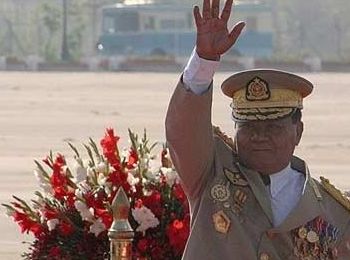– Through our contact with refugees and migrant workers from Burma we know that business in the country does not benefit the people, said Burmese Khin Ohmar to Ethical Trade Initiative Norway (ETI-Norway).
ETI-Norway had a swift meeting with Ohmar on 21 June 2010 as part of her Europe tour. Ohmar is coordinator of the network organisation Burma Partnership.  Her work is much about strengthening Burmese migrant workers, especially women, rights.
Her work is much about strengthening Burmese migrant workers, especially women, rights.
No belief in dialogue
Trade sanctions against Burma reduce jobs in potential export industry, but loss of jobs is not of great concern for Khin Ohmar. She does not believe that dialogue with the Burmese authorities will lead to anything.
– Sanctions can harm the people, as Aung San Suu Kyi also has said. But in Burma the sanctions have minimal effects on the people, says Ohmar.
According to Ohmar, to lift the sanctions does not reflect the voice of the Burmese.
– I am worried when I hear rumours about this. The biggest problem with the sanctions today is that we lack international coordination and efficient surveillance. We want the sanctions to be maintained and to make them more efficient as tools to influence the regime in Burma, said Ohmar to ETI.
Demands for rights are not heard
Based on 20 years work with human and labour rights at the Thai-Burma border Khin Ohmar is of the opinion that it is impossible to do business in Burma in a responsible way which benefits the people.
According to her, in 2010 thousands of workers in the textile industry around the commercial capital Rangoon have gone on strike and demanded better working conditions, h igher salary and less overtime.
igher salary and less overtime.
But demands for better working conditions do not give results.
– According to my sources the situation cannot be worse. They also say that the authorities are to blame, not the factory owners.
She explains:
– It does not matter whether the factory owner is from Korea, Hong Kong, Taiwan or Germany. We do hear that there are differences between owners in regard to how they treat the workers, but refugees tell us that even if the owners want to give the workers higher salary the authorities do not allow it, says Ohmar.
Factories owned by foreigners are usually in a so-called ”joint venture” with the military junta.
Khin Ohmar lives at the border in Thailand where she meets thousands of countrymen and women who cross the border trying to find something to live of. Many become workers in the export industry for clothes and food. Only in Thailand there are three million Burmese migrant workers.
According to Khin Ohmar the Burmese are seriously discriminated in Thailand. The organisation of Khin Ohmar has problems getting access to the factories, but they are able to find other ways to talk to the workers. Some lawyers in the area have specialized in legal advice for Burmese migrant workers.
When is boycott right?
ETI – Norway follow the same policy as Norwegian authorities. They usually recommend trade with developing countries and growing economies. ETI’s opinion  is that trade enhances development if the production includes decent working conditions and responsible environment management.
is that trade enhances development if the production includes decent working conditions and responsible environment management.
ETI declaration of principles states that they only support boycott of some countries based on broad international agreement. Today these countries are Burma and West Sahara.
The Government follows the UN. This means that potential sanctions should be broadly anchored and preferably adopted by the UN Security Council.
In the White Paper ”Corporate social responsibility in a global economy” (Report No. 10, 2008-2009) the Government makes it clear that it does not want to politicise Norwegian companies’ international engagement, nor develop rules for how they should handle problematic areas and countries. Burma and West Sahara are today the exceptions.
Ethical Trade Initiative Norway (ETI-Norway) is a resource centre and an advocate for ethical trade practices. ETI-Norway is established to help their members to solve the challenges linked to ethical trade and to strengthen the support for ethical trade.
HRH Oslo, based on the article, published at Norwegian Burma Committee website www.burma.no.
Related links:
EU mission to Burma – new approach to press ruling junta to adopt democracy?
EU extends Burma sanctions and calls on regime to stop breaking international law





